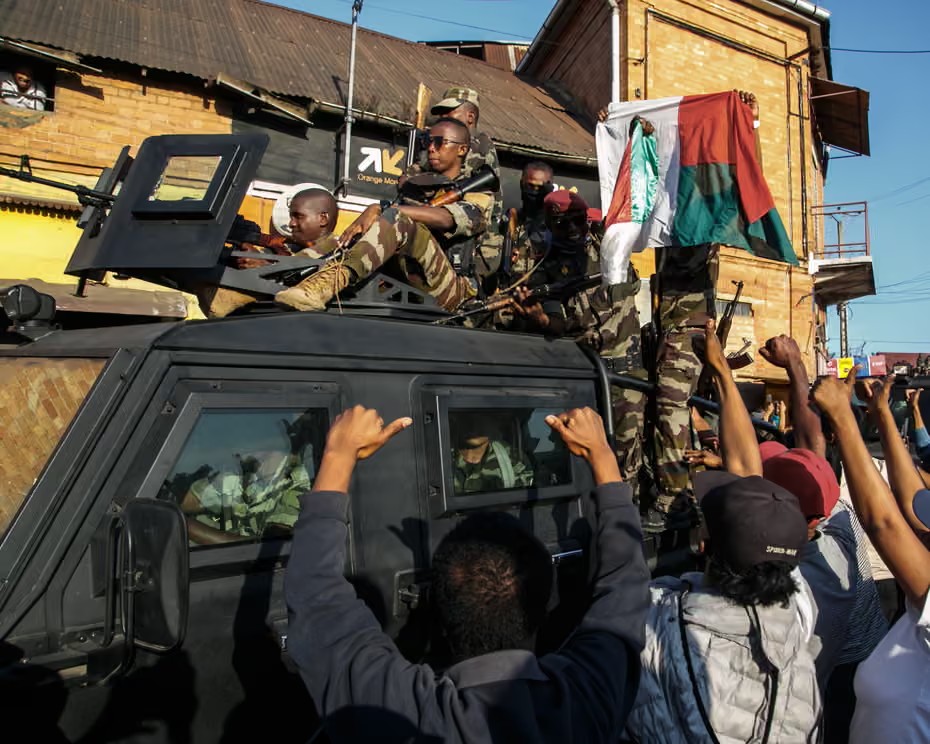
Antananarivo, Madagascar — The political crisis in Madagascar deepened this week as sections of the military refused to obey government orders to disperse demonstrators, instead declaring support for protesters demanding President Andry Rajoelina’s resignation. The unrest marks one of the gravest challenges to Rajoelina’s leadership since his return to power in 2019.
The protests, which began in late September over persistent electricity and water shortages, have swelled into a nationwide movement against what many describe as corruption, mismanagement, and economic hardship. Demonstrators in the capital, Antananarivo, have been joined by students, civil servants, and opposition figures, calling for systemic reforms and greater transparency in governance.
On Friday, eyewitnesses reported that elements of the army based near Soanierana refused orders to use force against protesters. In a statement circulating on social media, the soldiers urged their colleagues across the armed forces to “protect the people, not suppress them,” and to “defend comrades who refuse unlawful orders.” Their defiance echoes the actions of the elite CAPSAT unit, which in 2009 played a decisive role in ousting then-President Marc Ravalomanana — a historical parallel not lost on observers.
According to Reuters, soldiers from the CAPSAT contingent have again taken a visible role, escorting protesters who entered the symbolic May 13 Square — a site historically associated with popular uprisings in Madagascar. The move effectively defied government restrictions and demonstrated a widening split within the country’s security establishment.
President Rajoelina, who earlier this week dissolved his cabinet and appointed General Ruphin Fortunat Zafisambo as Prime Minister, has appealed for calm and proposed a national dialogue to resolve the crisis. However, the protesters have largely rejected the offer, calling it “too little, too late.” Demonstrators insist that the president must first resign before any talks can take place.
Despite mounting pressure, there has been no official statement from the presidency since Friday, fueling speculation about the president’s current location and control over the security apparatus. Government spokespeople have denied rumors that Rajoelina has fled the country, insisting that he remains “in communication with state institutions.” However, his absence from public view for several days has intensified uncertainty.
International reactions have so far been cautious. The African Union and the Southern African Development Community (SADC) have both urged restraint, calling on all sides to prioritize dialogue and constitutional order. Western embassies in Antananarivo have issued advisories warning citizens to avoid large gatherings.
Analysts say the unfolding events reveal deep fissures within Madagascar’s military hierarchy and expose public frustration over years of economic stagnation. The island nation, rich in natural resources, remains one of the poorest countries in the world, with over 75 percent of its population living below the poverty line.
As the standoff continues, the prospect of a negotiated resolution appears uncertain. The growing involvement of the military — historically a decisive factor in Madagascar’s political transitions — raises fears of another power shift by force rather than through democratic means.
For now, Antananarivo remains tense but defiant. Crowds continue to gather in central squares, waving the national flag and chanting for change, while soldiers stand among them — not as enforcers, but as fellow citizens demanding accountability.
Sources:
Reuters, The Guardian, Al Jazeera, Arab News, Africanews, Associated Press

